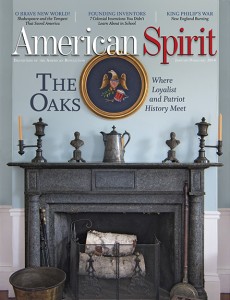 Every issue of American Spirit* invites readers to learn more about a historic home–and its owners–particularly those with connections to the Colonial or Early American period. Gracing the January/February cover is The Oaks, a Worcester, Mass., home finished at the end of the Revolution by Judge Timothy Paine and later occupied by his son, Dr. William Paine. Both Paines were Tories, but, ironically, the home is now owned and preserved by the Colonel Timothy Bigelow DAR Chapter, named for the Revolutionary minuteman, prisoner of war and military commander.
Every issue of American Spirit* invites readers to learn more about a historic home–and its owners–particularly those with connections to the Colonial or Early American period. Gracing the January/February cover is The Oaks, a Worcester, Mass., home finished at the end of the Revolution by Judge Timothy Paine and later occupied by his son, Dr. William Paine. Both Paines were Tories, but, ironically, the home is now owned and preserved by the Colonel Timothy Bigelow DAR Chapter, named for the Revolutionary minuteman, prisoner of war and military commander.
Another feature honors the French-born Patriot Comte de Rochambeau. He forged an effective partnership with George Washington and played an integral role in the British defeat at the Siege of Yorktown.
We delve into law and order, early-American-style, for a feature on Virginia statesman George Wythe. We investigate the mysterious circumstances of this Patriot’s painful death, probably at the hands of his ne’er-do-well grandnephew.
When we think of Colonial inventors, Benjamin Franklin’s name is at the top of the list, but his contemporaries were hard at work on their own inventions, too. We look at several lesser-known inventors and inventions from Colonial times, such as Oliver Evans, who pioneered the automatic flour mill; Sybilla Masters, who patented a new kind of corn mill; and John Hobday, who was granted a prize for inventing a wheat-threshing machine.
This April marks the 450th anniversary of William Shakespeare’s birthday, as well as the 400th anniversary of the marriage of Jamestown settler John Rolfe and Pocahontas, daughter of an American Indian chief. We uncover surprising connections between Shakespeare and these Colonial Virginia settlers, particularly in the inspiration of the great playwright’s late-in-life work, “The Tempest.”
*For more than a decade, Hammock has been honored to assist the National Society Daughters of the American Revolution in publishing their award-winning magazine. Anyone can subscribe here.

